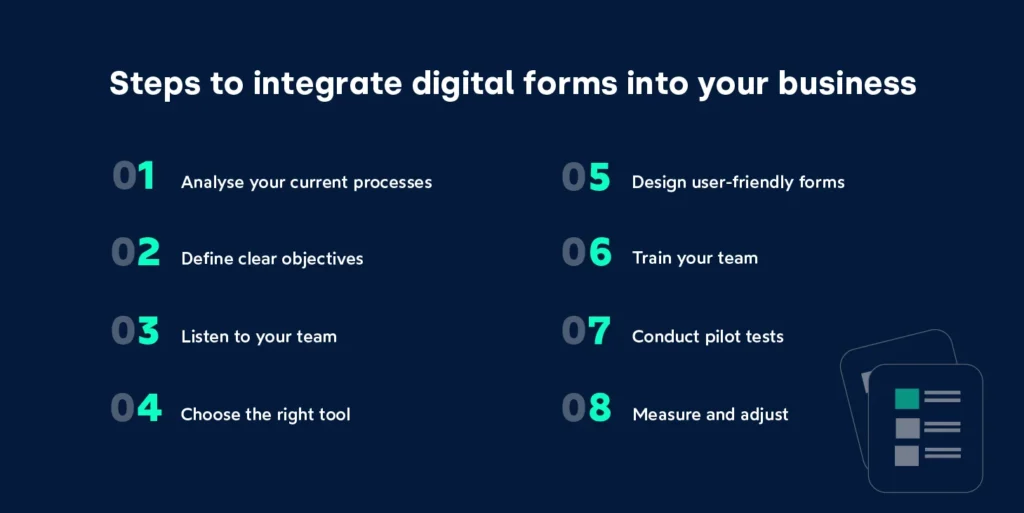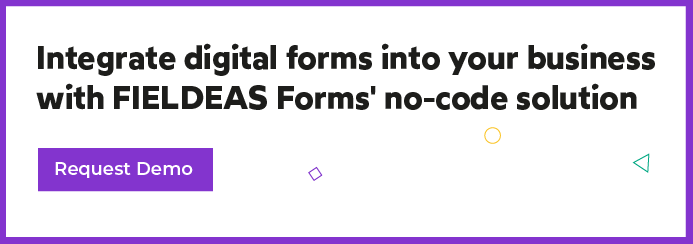More and more organizations are deciding to integrate digital forms into their processes because they have realized that paper forms generate delays, errors and excessive manual work.
In fact, digitizing data collection and management in the field not only saves time, but also allows information to be managed in a more agile and secure way.
So, adopting digital forms is not simply about filling out a document online. It’s about transforming the way your company collects, organizes and leverages data, achieving more efficient internal processes and a better experience for customers and employees.
In this post we analyze how to take the step strategically, what benefits you will get and what are the key steps to integrate digital forms in your company successfully.
Why digital forms are key for your business?
The decision to replace traditional processes with digital forms is strategic, not just technological. Why? In the post 7 reasons why you should choose Smart Forms over paper forms we analyze it in depth.
Here are some of the main advantages of leaving paper forms behind:
1. Reduction of errors and duplicities
Paper forms require manual transcription, which increases the risk of errors. Digital forms, on the other hand, allow automatic validation of information, reducing errors from the start.
2. Time and cost savings
Printing, archiving and physical storage costs are eliminated, and data is delivered immediately to those who need it.
3. Improved customer experience
By reducing manual tasks, the team can focus on listening to the customer, resolving questions and providing better service.
Although the forms are not always visible to the consumer, their implementation generates smoother processes that increase satisfaction and trust in the brand.
Steps to integrate digital forms in your company
The success of implementing digital forms in your company depends not only on the tool, but also on how the transformation is carried out.
For this reason, here are a series of recommendations to take into account before implementing smart forms in your operations.
1. Analyze your current processes
Before integrating digital forms, identify which processes depend on data collection:
- Field data collection
- Asset maintenance sheet
- Warehouse orders
- Stock control of materials
- Management of activities and tasks
- Anomaly and incident reporting
- Corrective maintenance requests
- Regulatory compliance registry and safety audits
- Task tracking and unemployment of the maintenance team
- Management of work by external personnel
- Inspections per campaign
- Contact forms and customer service
- Surveys and questionnaires
2. Define clear objectives
Ask yourself what you want to achieve with digitization:
- Reduce costs
- Accelerate approval flows
- Obtain more accurate and real-time information
- Improve productivity
- Minimize errors
- Optimize decision making
- Improve user experience
- Driving sustainability objectives
3. Listen to the team
In the end, it is the technicians who use these tools on a daily basis to collect data in the field. Listen to your team, their input is key to adoption.
4. Choose the right tool
When selecting the platform, keep in mind:
- Ease of use
- Integration with other systems (ERP, CRM, BPM, WMS, MES, CMMS, CMMS…)
- Security level and regulatory compliance
- Possibilities for future growth
- Intelligent real-time data capture
- Automatic transmission and centralization of information
- Immediate visualization and exploitation

5. Design user-friendly forms
A poorly designed form generates abandonment. A few tips:
- Clear and easy to understand questions
- Request only essential information
- Drop-down menus, predefined lists and checkboxes
- Mobile compatibility and offline option for field use
- Automatic validations to ensure the quality of the data
6. Train the team
Staff must understand how the new forms work and how to take advantage of them. Brief training increases adoption.
7. Conducts pilot tests
Implement a digital form in a single department before extending it to the entire company. This allows you to adjust details without risk.
8. Measure and adjust
Monitors indicators such as error reduction, response times or customer satisfaction. Adjust as necessary for continuous improvement.
Common mistakes when digitizing business forms
Although the integration of digital forms in companies is a simple procedure, certain common pitfalls should be avoided:
- Digitizing without redesigning processes: converting a form into a PDF is not enough.
- Asking for too much information: discourages the user and reduces participation.
- Failure to integrate with other systems: generates data silos that make management difficult.
- Neglecting security: not all solutions offer adequate protection.
Tips for successful digital forms integration
- Start with the most commonly used forms to show quick results.
- Periodically review the forms and update them according to new needs.
- Communicate benefits to employees and customers to encourage usage.
Discover in the post Main benefits of digital forms for companies how these tools boost business productivity by optimizing resources and reducing costs.
Integrate digital forms from FIELDEAS Forms
Integrating digital forms in your company is not a simple operational change: it is a strategic investment in productivity, security and customer experience. With clear objectives, the right tool and a solid implementation plan, results can be seen in a short time.
In this sense, FIELDEAS Forms stands out as a robust and flexible solution for companies wishing to digitize their data collection processes in the field.
This no-code platform allows the creation of intelligent forms in a matter of minutes, integrating images, video, audio, geolocation and electronic signature without the need for technical development.
Main functions of FIELDEAS Forms
- No-code solution
- Web and mobile application. Adjustable to all types of users
- Online/Offline. Works with or without connection
- Multiplatform. Android, iOS, tablet, smartphone
- Multilanguage. Spanish, English, French, Portuguese…
- User management. Roles, profiles, groups, internal and external users
- Multinavigator. In any browser and operating system
- Data encryption. Total information security
- Pay-per-use. Adjusted to your daily activity
- Notifications. Specific notices to working groups
- Interface customization. Adapt colors, logos and styles of the application
- Support and updates. Continuous maintenance and automatic improvements





